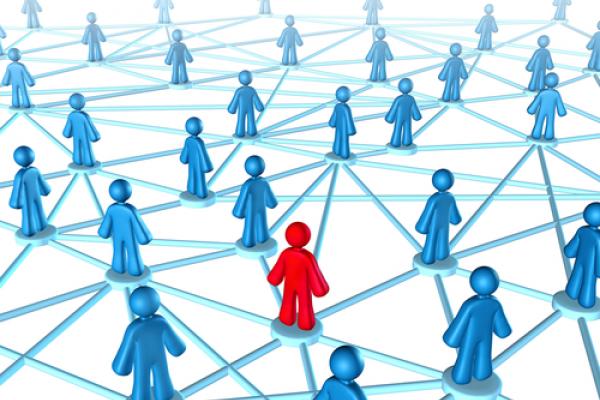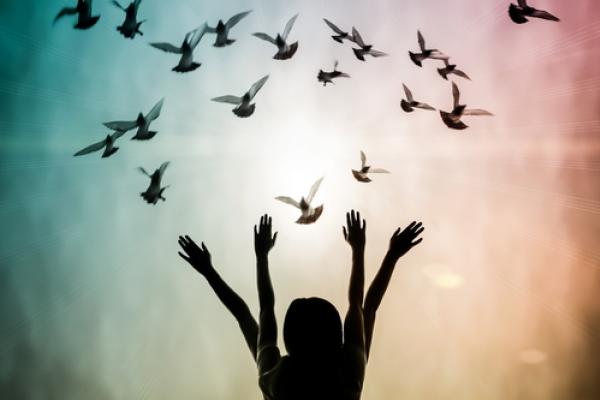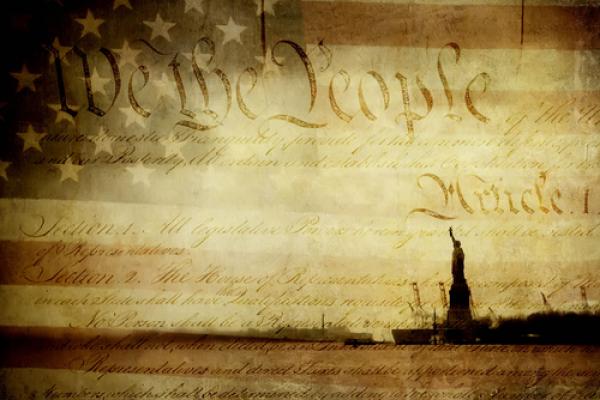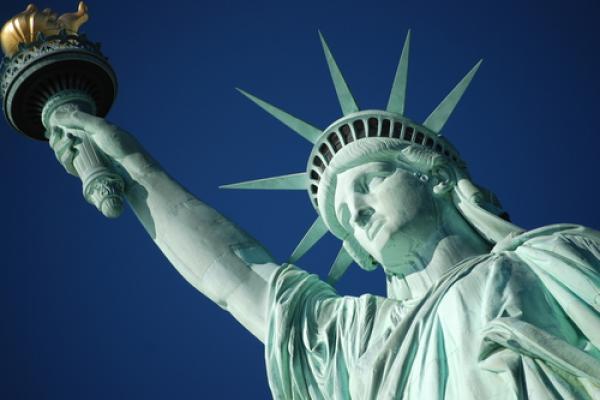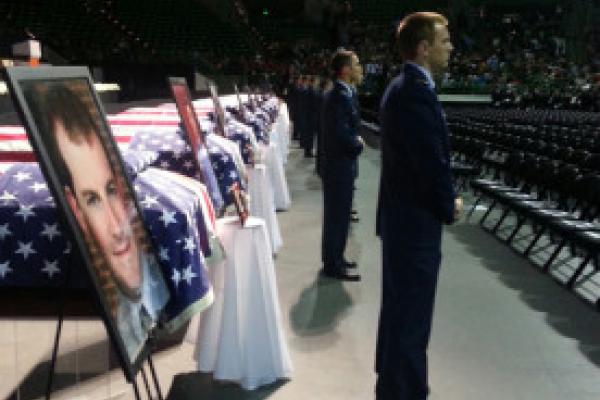As we celebrate our nation’s independence this week, it’s good that we also celebrate our interdependence. Everything that we do, everything that we have, all that we are bears the fingerprints of countless others from around the world who have brought us to this moment and sustain us in it.
We tend to overlook this reality. We like to think of ourselves as independent. We dread those times when we feel dependent upon others — when we’re sick or struggling and need some sort of assistance. We’d rather do it ourselves and feel independent, even though we‘re really not.
On July 4th I will be attending the annual party at my son and daughter-in-law’s home. They will be serving up smoked chicken and spare ribs while fireworks from neighboring towns inscribe a nearly 360° circle around their backyard. While we are waving our flags with differing degrees of enthusiasm, one member of my family will not be with us: my sister the Jehovah’s Witness. As much as we’ve tried to persuade her that the holiday is just an excuse for the family to get together, she will not give succor to patriotic fervor. By partaking of our celebration she feels that she risks having her attendance misinterpreted as an endorsement. For Jehovah’s Witnesses, the trouble with patriotism is twofold: 1) it tempts us to equate God and nation, and 2) it provides a sacred cover for violence.
God and nation are not the same, my sister believes. When a government’s demands come into conflict with God’s, Witnesses obey God. Jehovah’s Witnesses believe that Jesus emphasized love of neighbor and service to others and that the early Christians refused to become soldiers and fight in wars. In emulation of that dedication to serve God and not governments, Witnesses not only refuse to celebrate national holidays but they are conscientious objectors to military service.
Tomorrow, millions of people across this land, will be celebrating our nation’s freedom. Many will be marking Independence Day by going to see the fireworks, watching Fourth of July parades, or just having a barbecue and enjoying time together with their family or friends.
One of the things I began doing a few years ago on the Fourth of July was to call a very special person in my life and in the life of my family. His name is Paul Anderson. Had it not been for Paul and his family, my family and I would not have been able to emigrate in 1987 from Poland to the United States. So on every July 4, I call Paul and thank him for helping me and my family arrive safely and settle in this country.
I tell him that he’s had an important part to play in so many good things I’ve experienced over the past 26 years that I’ve been living here — including discerning a Franciscan vocation and becoming a friar.
What do I love about America? I love the land, one of the most spectacularly beautiful countries in the world (and I’ve visited many of them). I love walking our long stretches of beaches, hiking our majestic mountains, seeing the desert skies, walking beside the rivers, sailing along the coasts, and visiting hundreds of lakes in my home state of Michigan, where I camped as a kid. I even love some of our big cities! “O beautiful for spacious skies, for amber waves of grain, for purple mountain majesties, above the fruited plains.” I love our many diverse cultures, including their music, their food, their art, their sports, and their particular stories and histories.
I especially love our best national values: freedom, opportunity, community, justice, human rights, and equality under the law for all of our citizens of every race, creed, culture, and gender, not just for the rich and powerful. In particular, I love our tradition and history of democracy, its steady expansion here, and how it has inspired the same all over the world. We take legitimate pride in seeing how our founding documents have been the models for many new nations.
Forget about future generations – climate change is already hitting poor people around the world, not to mention contributing to natural disasters in the U.S. from New York City to Arizona. Apparently that’s not enough for some members of Congress, who have chosen to use their authority to try to block any and all attempts to do something about the problem.
Earlier this month, President Barack Obama announced a major, comprehensive plan of action on climate change – changes that would do much to protect human health, the poor, and future generations by mitigating some of the worst impacts of climate change. A central part of the plan is to address climate pollution at its largest source: coal-fired power plants.
Unfortunately, many members of Congress are already taking steps to decry the president’s plan as a “war” – on coal, on American energy, and yes, even on America itself. Leaders from John Boehner to Michele Bachmann to Joe Manchin have made it pretty clear that they view attempts to care for creation as an assault on our country.
“If you love somebody, set them free. Free. Free. Set them free.” Of all the songs to come to mind during this Independence Day weekend, this one rings in my head. Sting, the artist, did not have America’s freedom celebration in mind when he coined these words. Honestly, the song has little to do with patriotism; it is more of a ballad of love lost and letting go. Nonetheless I dare to invoke it, as the words resonate with the spirit of autonomy that is so pervasive on July 4. “Set them free. Free. Free. Set them free.”
Each year at this time, our country focuses on liberty, the red-white-and-blue, and “My Country Tis of Thee.” I am grateful to live in the U.S. and the freedom this affords. Yet, what about persons who are not so independent — the unemployed who rely on federal subsidies, children whose schools are closing due to no fault of their own, and yes, the millions of Americans in the prison system? Although the Fair Sentencing Act of 2010 reversed the disparity between crack and cocaine convictions implemented by the Anti-Drug Abuse Act of 1986, the prison rate remains exorbitant. More than 2.2 million are still behind bars. The Texas execution rate is at 500 and counting. Forty-eight percent of persons in federal prisons were convicted of drug offenses, according to The Sentencing Project. A reversal in policy three years ago has not flipped today’s prison numbers. So many are not free.
WASHINGTON — Just days after the Obama administration issued final rules to religious groups for its contraception mandate, a broad coalition spearheaded by Catholic and Southern Baptist leaders is pushing back, saying the rules threaten religious liberty for people of all faiths.
In an open letter titled “Standing Together for Religious Freedom,” the group says the final rules from the U.S. Department of Health and Human Services violate their freedom of conscience.
“We simply ask the government not to set itself up as lord of our consciences,’’ said Russell Moore, president of the Southern Baptist Convention’s Ethics & Religious Liberty Commission. He was joined by Archbishop William E. Lori of Baltimore at a news conference at the National Press Club.
“HHS is forcing Citizen A, against his or her moral convictions, to purchase a product for Citizen B,” reads the open letter signed by dozens of leaders from evangelical, Orthodox, Mormon and Hare Krishna groups. “The HHS policy is coercive and puts the administration in the position of defining — or casting aside — religious doctrine. This should trouble every American.”
As friends and families reel from the news that 19 elite firefighters died battling an Arizona wildfire Sunday, the work of some of their spiritual comrades has just begun. Fire chaplains are stepping up to support the grieving, just as they did after 9/11 and the recent fertilizer plant explosion in West, Texas.
“What we do is we come alongside the survivors,” said Chaplain Jimmie Duncan, president of the Texas Corps of Fire Chaplains. “Sometimes we’re quiet. Sometimes we hug them. Sometimes we pray. … We just stand there with them and try to meet their needs and walk alongside them through the darkest part of their lives.”
Duncan is the associate director of the South Central Region of the 700-member Federation of Fire Chaplains. About half of the chaplains in the federation are ministers, and half are firefighters who have trained to become chaplains. Their everyday duties are similar to that of other pastors — visiting sick firefighters, providing basic counseling and praying at civic events and fire department ceremonies.
But officially notifying a loved one who just lost a firefighter is “absolutely one of the toughest things we ever do,” said Duncan, who spoke at the April memorial service for the West firefighters and sat next to first lady Michelle Obama.
“Not only do we have to tell them that their loved one was dead but we weren’t able to do anything to prevent that. It’s very tough for us as firefighters to have that to do,” he said.
